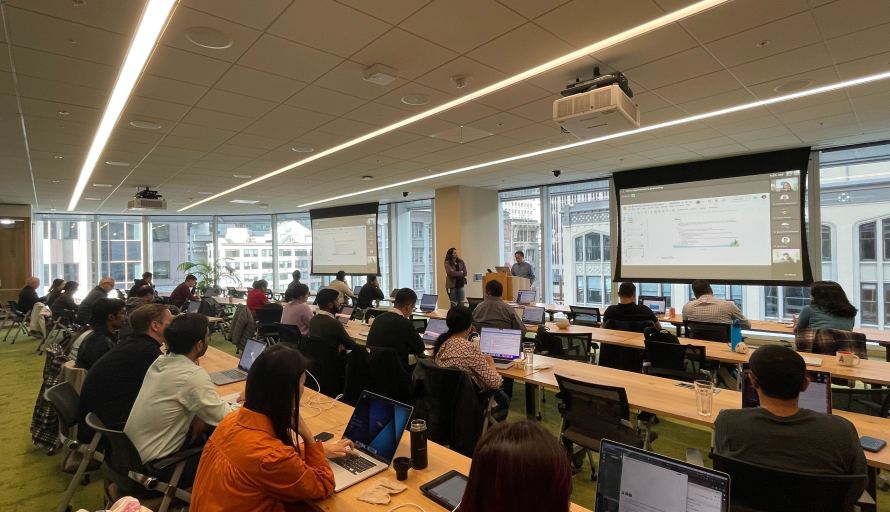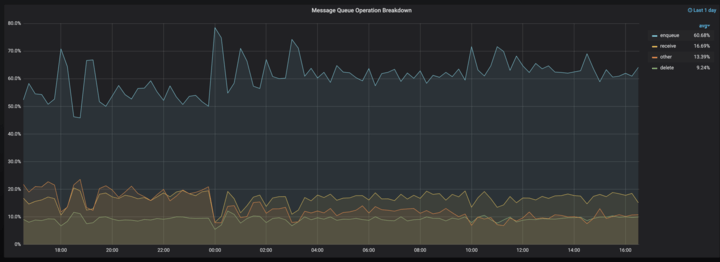
Written by Ramesh Ragineni and Scott Nyberg.
During the COVID-19 pandemic, Salesforce and many other software companies asked its employees to work from home to help safeguard their safety and their families. The Salesforce Industries team — innovators of industry-specific digital solutions for global companies across verticals — remained highly productive, developing and delivering a cutting-edge emergency response management product within just 29 days, a historical first at Salesforce.
Across the software development industry, up to 50% of developers reported that working from home enabled them with increased focus and flexibility. Conversely, nearly the same number of respondents complained about remote teamwork and collaboration. Those engineers also exhibited feelings of isolation and lack of peer connections. Ultimately, working from home might not be a one-size-fits-all approach for every engineer.
Salesforce’s Return & Remote approach empowers leaders to make decisions for their teams about how and where they best work — whether that’s customer-facing or office-flexible. For the Salesforce Industries team, that means the engineering team is both connecting in-person and allowing for focused work at home.

So, which productivity secrets drive Salesforce Industries’ success? It might surprise you and give you the inside track to take your engineering work and career to greater heights. Read on to learn more about our best practices.
1. Find Balance
To maximize the quality of Industries team products, engineers strive to find the right balance between working from home and connecting in the office. For example, when developers must go “heads down” to complete their code in support of an impending deadline, they may consider doing so remotely.
Following that, meeting up with their team in person empowers engineers to discuss their choices and collaborate, which could include debate and whiteboard sketching to enhance their work. Then, based on their team’s feedback, they may return home to update their code.
2. Connectivity Boosts Productivity
When our offices were closed during the pandemic, Industries teammates connected more informally via online virtual “coffee chats.” While those chats helped build community, they felt like one-time transactions instead of personal connections.
When engineers can work with others they genuinely care about and trust, everything improves. As engineers walk into a Salesforce building and see their teammates, whom they regularly bond and connect with, it becomes much more fun to collaborate with them daily in the office and meetings. For instance, after a team completes a project, they may high-five each other and go out for coffee to celebrate and build friendships. Building that sense of continuity day after day drives camaraderie, fuels innovation, speeds up go to market, and enhances team-wide productivity.

3. Debate Helps Create Great Code
Magic happens when dozens of engineers gather in our offices and towers and review code on big screens. The electricity is palpable in these dynamic spaces as the team argues the code’s merit, working together to optimize it. The energy sparks debate as colleagues probe each other’s decisions and ask, “Did you consider this?” or “Did you try that?” Engineers view their work in a new light by learning, collaborating, connecting, empowering them to turn good code into great code.

4. Reading the Room Drives Innovation
During debates, extroverted engineers freely offer their opinions. Conversely, introverted engineers may briefly raise their hands and withdraw, unwilling to interrupt the conversation. Ultimately, their body language speaks volumes when the team connects. Noticing this, the team leader may acknowledge these engineers and say, “Let’s pause to ensure everyone here has an opportunity to share their views.” Opening up this communication channel may produce the best idea in the room.
Similar inclusivity occurs during online meetings, where engineers can hit a button, raising their virtual hand — empowering them to be seen and heard by their peers.
5. A Picture is Worth 1,000 Words
Salesforce Industries teammates regularly meet in offices and collaborate, sketching their ideas on a whiteboard to articulate their views and drive alignment.
Connecting across time zones, teammates collaborate in real-time and asynchronously via numerous online whiteboarding tools — enabling engineers to pitch concepts, brainstorm ideas, facilitate meetings, and much more.

6. Moments Matter
During release planning, sprint planning, and similar types of sessions, connecting in-person remains a powerful approach for enabling teams to reach a common goal. These meetings greatly value the team’s views and opinions as release dates are discussed or shifted, and features may be reprioritized. Sharing these moments helps drive team-wide understanding and is integral to our success.
7. Communication Counts
During online meetings, as engineers join, they may wait silently until the meeting starts, then exit the app immediately after the chat concludes. In-person meetings bring a different dimension. As people filter into the conference room before the meeting and connect, they may talk about their weekends, a cool movie they recently watched, or offer project advice, which builds relationships. After the meeting, the discussion may continue as inspired engineers disperse into the hallways or break rooms — sharing their perspectives and brainstorming new ideas to help take projects to the next level.

8. Learn from the Ground Up
Fresh-out-of-college engineers typically learn the basics of writing code in school, where their engineering journey begins. What are the steps they must take to grow into high-performing software professionals? It starts by learning how to engage with others. This can be best achieved by accelerating in-person engagements — physically shadowing, observing, and collaborating with fellow software engineering teammates. These face-to-face connections empower junior engineers to learn best practices and collaborate effectively as a team.
The learning does not stop there. In today’s largely hybrid working world, junior engineers must master effectively working and receive coaching, mentorship, and support in a virtual environment.

Meet the next generation of Salesforce engineers.
9. Find Your Mentor
In addition to learning in-person from their peers and supervisors, young software engineers greatly benefit from on-site insights from engineering mentors. These senior leaders offer their extensive experience to help explain complex engineering topics and offer professional advice that could never be learned in a college classroom — enabling engineers to elevate their craft.
While in-person mentorship speeds the building of personal connections, Salesforce Industries engineers also find balance by seeking out virtual mentorship. In fact, Salesforce built a MentorFinder app during the pandemic to virtually connect mentors and mentees across a global, ever-expanding network.
From team bonding to debating code to collaboratively sketching ideas on a whiteboard, Industries Cloud engineers continue accelerating their productivity and boosting camaraderie by connecting in person when it matters most. However, this is not a one-size-fits-all approach as our engineers are empowered to make the right decisions for themselves — finding the balance between working from home and working side-by-side on site. Engineers in any company can apply these proven productivity tips — put them to use today, and the sky is the limit for your work, career, and team effectiveness.
Learn more
- For a deeper dive into the Industries Cloud team, read this blog.
- Stay connected — join our Talent Community!
- Check out our Technology and Product teams to learn how you can get involved.






